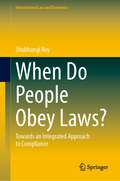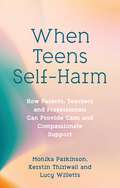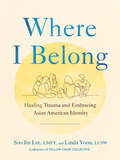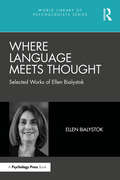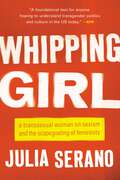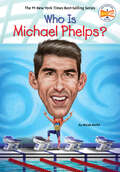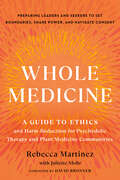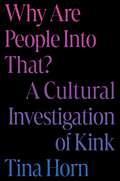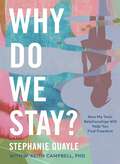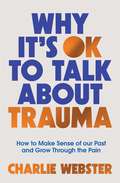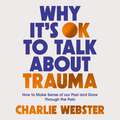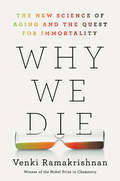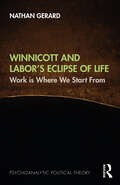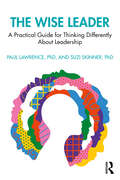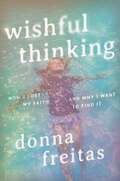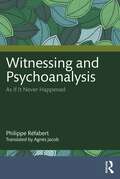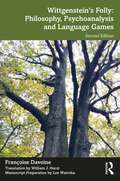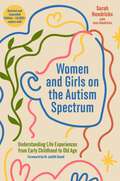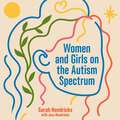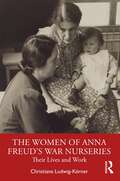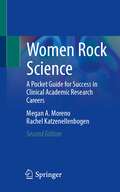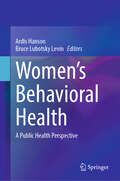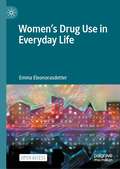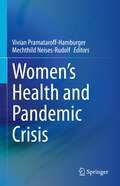- Table View
- List View
When Do People Obey Laws?: Towards an Integrated Approach to Compliance (International Law and Economics)
by Shubhangi RoyThis book examines the intricate dynamics of when individuals adhere to laws, taking into account the context in which laws attempt to shape human behavior. While existing literature touches upon various reasons why people comply with laws, the book focuses on a critical question which has been missing from the discussion: when do people obey laws? By treating law as a form of social communication, it develops an integrated framework to answer this question. It explores how social, psychological, and institutional conditions shape compliance decisions of individuals. What does a law signify? When does the compulsion to obey arise? When do individuals comply out of a fear for legal sanctions or social repercussions? Why do some laws have high symbolic values and others fail despite harsh punishments? The book unveils the contextual intricacies that underlie obedience to law. It challenges conventional wisdom and offers a fresh perspective on the power and limitationsof law in shaping human behavior. For scholars and academics seeking a deeper understanding of legal compliance and role of law in shaping behaviors, this book will be an indispensable resource.
When Teens Self-Harm: How Parents, Teachers and Professionals Can Provide Calm and Compassionate Support
by Monika Parkinson Lucy Willetts Kerstin ThirlwallSupporting teens who self-harm can be stressful, with panic and anxiety muddying the waters and making it difficult to know how to respond. How do you help? What if you make it worse?This book guides you through the potential reasons for self-harming behaviour, helping you to respond with compassion and support. Quotes from young people who self-harm give insight into the mindset behind the behaviour, while expert guidance gives you the tools to help. Advice on regulating your own emotions, combined with a better understanding of why teens self-harm, allows you to provide a safe, nurturing environment to support your young person and reduce their self-harming behaviour.Grounded in the authors' extensive clinical experience in young people's mental health, this book guides you out of panic mode to create a secure, validating environment for teens who self-harm.
Where I Belong: Healing Trauma and Embracing Asian American Identity
by Soo Jin Lee Linda YoonAn essential resource that addresses the unique experiences of trauma, healing, and mental health in Asian and Asian American communities.Coauthors Soo Jin Lee and Linda Yoon are professional therapists who witnessed firsthand how mental health issues often went unaddressed not only in their own immigrant families, but in Asian and Asian American communities. Where I Belong shows us how the cycle of trauma can play out in our relationships, placing Asian American experiences front and center to help us process and heal from racial and intergenerational trauma. This book validates our experiences and helps us understand how they fit into the broader context of our family history and the trauma experienced by previous generations. Lee and Yoon draw on their own stories, as well as those of a diverse segment of the Asian diaspora, to help us feel seen and connected to our wider community. They provide essential therapeutic tools, reflection questions, journal prompts, and grounding exercises to empower readers to identify their strengths and resilience across generations and to embrace the beauty and fullness of their own identity and culture.
Where Language Meets Thought: Selected Works of Ellen Bialystok (World Library of Psychologists)
by Ellen BialystokIn the World Library of Psychologists series, international experts present career-long collections of what they judge to be their most interesting publications – extracts from books, key articles, research findings, and practical and theoretical contributions.Ellen Bialystok has published widely in the field of cognitive development and decline across the lifespan. Her research uses behavioral and neuroimaging methods to examine the effect of experience on cognitive and brain systems with a focus on bilingualism. Her discoveries include the identification of differences in the development of cognitive and language abilities for monolingual and bilingual children, the use of different brain networks by monolingual and bilingual young adults performing cognitive tasks, and the postponement of symptoms of dementia in bilingual older adults. In other studies, she has investigated the effects of bilingual education on children’s development and the cognitive and brain consequences of bilingualism in older adults.Including a specially written introduction, in which Ellen Bialystok reflects on the role that language plays on thought, this collection will serve as a valuable resource for students and researchers of psycholinguistics, developmental psychology, and applied linguistics.
Whipping Girl: A Transsexual Woman on Sexism and the Scapegoating of Femininity
by Julia SeranoThis classic manifesto is &“a foundational text for anyone hoping to understand transgender politics and culture in the U.S. today.&” (NPR)*Named as one of 100 Best Non-Fiction Books of All Time by Ms. Magazine* In Whipping Girl, biologist and trans activist Julia Serano shares her experiences and insights—both pre- and post-transition—to reveal the ways in which fear, suspicion, and dismissiveness toward femininity shape our attitudes toward trans women, as well as gender and sexuality as a whole. Serano's well-honed arguments and pioneering advocacy stem from her ability to bridge the gap between the often-disparate biological and social perspectives on gender. In this provocative manifesto, she exposes how deep-rooted the cultural belief is that femininity is frivolous, weak, and passive. In addition to debunking popular misconceptions about being transgender, Serano makes the case that today's feminists and transgender activists must work to embrace and empower femininity—in all of its wondrous forms.
Who Is Michael Phelps? (Who Was?)
by Micah Hecht Who HQFind out how a mischievous boy became a phenomenal swimmer and the greatest Olympian of all time in this inspiring addition to the #1 New York Times bestselling Who Was? series!Born and raised in Baltimore, Maryland, Michael Phelps began swimming at age seven at the urging of his mom. As a young boy, Michael was brimming with energy--more energy than most other kids his age--and Mrs. Phelps thought this sport could help keep him calm and focused. As Michael grew older, his skills improved, and he transformed into one of the greatest swimmers in the world, winning twenty-eight Olympic medals.Outside of the pool, Michael became an advocate for mental and physical health for adults and children. He even founded an organization that teaches water safety and promotes healthy living. Young readers can learn more about Michael Phelps's thriving legacy in this illustrated middle-grade biography.
Whole Medicine: A Guide to Ethics and Harm-Reduction for Psychedelic Therapy and Plant Medicine Communities
by Rebecca MartinezA comprehensive framework for ethical psychedelic medicine—a guide for therapists, trip sitters, and anyone concerned about upholding boundaries and safety in the entheogen and plant medicine communityPsychedelic advisor Rebecca Martinez lays out the groundwork for an ethical approach to 21st-century psychedelic therapy. Applying a social-justice lens to entheogenic practice, Martinez provides practical guidance for psychedelic sitters, advocates, explorers, and those practicing (or learning to practice) licensed psychedelic therapy.As psychedelics become a more accessible pathway to healing, how do practitioners—and seekers—navigate complex issues in a wide range of settings? Here, you&’ll learn skills like:Understanding consent and boundariesBuilding safe and ethical psychedelic experiencesHow to integrate the cultural and historical contexts of plant medicinesConsidering the psychological risks and benefits of psychedelic therapyHow to apply a social-justice lens to entheogenic healingMartinez also discusses how, in many corners of the psychedelic community, an overemphasis on positivity can overwhelm attempts to challenge abuses of power; dismantle internalized hierarchies; and acknowledge and integrate our own flaws and traumas.An essential guide for any psychedelic therapist, entheogenic guide, or mind-expanding medicine enthusiast, Whole Medicine brings much-needed conversations about ethics, boundaries, and informed use out of the shadows for better, safer, community-centered psychedelic healing.
Why Are People Into That?: A Cultural Investigation of Kink
by Tina HornFrom a #1 Apple podcast host, Lambda Literary fellow, and dominatrix comes a sex-positive, judgment-free cultural deep-dive into the world of kink. When celebrated BDSM educator Tina Horn first launched Why Are People Into That?!, publications from Vice to Buzzfeed heralded it as one of the best sex podcasts around. Each episode centered around a different fetish or fantasy, thoughtfully examining why, exactly, different strokes work for different folks. From sex workers and scientists to artists and activists, Tina&’s wide range of guests helped educate fascinated listeners across the world on the wide spectrum of humanity&’s appetites. With her listeners growing more and more insatiable, she soon realized that the only way to address the titular question with all the depth and nuance it deserved was to turn that idea into a book. From spanking, strap-ons, and sluts, to taboos involving cake, chains, and cannibalism, WHY ARE PEOPLE INTO THAT? explores the universal drives that shape even the most specific erotic tastes, and the cultural context that molds and is molded by the way we conceptualize pleasure, gender, fantasy, and power. With buoyant prose, Tina invites us to reconsider everything we thought we knew about sexuality. How, for example, should we think about "consensual nonconsent" in a post-#MeToo era? How does cross-dressing fit in with our evolving cultural understanding of gender performance and identity? And what do foot fetishists, fisters, and FinDoms have in common? Blending insightful cultural criticism, investigative journalism, and spicy anecdotes from Tina&’s 15+ years of hard-earned expertise in the sex industry and beyond, WHY ARE PEOPLE INTO THAT? is a philosophical-but-fun exploration of the prismatic spectrum of human desire and the expansive possibilities of pleasure. For fans of adrienne maree brown and Emily Nagoski, this raunchy and rousing book is perfect for anyone who is interested not only in the intricacies of what we desire, but in how desire itself really works.
Why Do We Stay?: How My Toxic Relationship Can Help You Find Freedom
by Stephanie QuayleYou or someone you love may be in a toxic relationship, but it doesn't have to stay that way. In this compassionate and practical resource, Stephanie Quayle shares her powerful story alongside psychologist Dr. W. Keith Campbell's professional insights to give you the help and hope you need—and remind you that you are not alone.When Stephanie lost her boyfriend in a plane crash, she faced intense grief and pain. Nothing compared, though, to the shock of discovering she had not been the only woman in his life. As her world unraveled around her, Stephanie realized that it had actually been unraveling from the start of their relationship—back when he promised her everything.In Why Do We Stay? Stephanie draws on her story to explain how to spot a toxic relationship, how to get out, and how to heal. Mental health expert Dr. W. Keith Campbell joins her in helping you see that:You can make a change in your lifeThere are warning signs to look for and ways to spot an unhealthy relationshipYou don&’t have to be a victim to narcissism or gaslighting or lose years of your lifeWhether you stay in or leave your relationship, healing and freedom are possible Why Do We Stay? is ideal for:Those who feel trapped in an unhealthy relationshipThose who are recovering from a toxic relationshipReaders searching for a resource—for themselves or for a friend—on narcissism, gaslighting, compulsive lying, and other destructive behaviors With a powerful blend of clinical research, gripping storytelling, and unvarnished hope, Why Do We Stay? empowers you to make changes in your life. You are not alone.Discover a way forward.
Why It's OK to Talk About Trauma: How to Make Sense of the Past and Grow Through the Pain
by Charlie WebsterTHIS IS THE BOOK YOUR BRAIN, BODY AND FUTURE SELF NEED TO READ.More than half of us will have experienced some kind of trauma in our lives - many of us multiple times over. But most of us ignore or avoid our traumatic experiences, and struggle alone in the emotional pain that remains. In Why It's OK to Talk About Trauma, award-winning journalist and campaigner Charlie Webster explores what trauma is, how trauma impacts us mentally, emotionally and physically, and why our past experiences influence our day-to-day behaviours. She draws on her own story, research and insight, backed by the clinical psychologist that treated her.'I wrote this book following my journey through trauma recovery. I've included everything I've learnt in the hope that it will also help you. I want to show you that it is okay to talk about trauma, but I know it's not easy. Sometimes it's hard to admit that what has happened to us affects us so deeply. But by the time you turn the final page, my intention is that you will feel different; what has happened will not have disappeared but it will feel more manageable and you will be equipped to deal with trauma and life moving forward.Whatever has happened to you, we can face it together in this book. I am with you on this journey.'
Why It's OK to Talk About Trauma: How to Make Sense of the Past and Grow Through the Pain
by Charlie WebsterWhy It's OK to Talk About Trauma is the book your brain, body and future self need to read. 1 in 2 people experience trauma at some point in their lives. Trauma can be a result of anything which causes fear, helplessness and horror.Broadcaster and abuse survivor Charlie Webster uses her own lived experience alongside advice from experts to create a companion for trauma survivors – a book that will help, explain, understand and navigate the impact of trauma on our lives.As someone who has experienced multiple traumas, Charlie has written the book she longed for when she was working through her traumatic past. She shares her story whilst providing insight, support and tools to help trauma sufferers and their loved ones.
Why It's OK to Talk About Trauma: How to Make Sense of the Past and Grow Through the Pain
by Charlie WebsterTHIS IS THE BOOK YOUR BRAIN, BODY AND FUTURE SELF NEED TO READ.More than half of us will have experienced some kind of trauma in our lives - many of us multiple times over. But most of us ignore or avoid our traumatic experiences, and struggle alone in the emotional pain that remains. In Why It's OK to Talk About Trauma, award-winning journalist and campaigner Charlie Webster explores what trauma is, how trauma impacts us mentally, emotionally and physically, and why our past experiences influence our day-to-day behaviours. She draws on her own story, research and insight, backed by the clinical psychologist that treated her.'I wrote this book following my journey through trauma recovery. I've included everything I've learnt in the hope that it will also help you. I want to show you that it is okay to talk about trauma, but I know it's not easy. Sometimes it's hard to admit that what has happened to us affects us so deeply. But by the time you turn the final page, my intention is that you will feel different; what has happened will not have disappeared but it will feel more manageable and you will be equipped to deal with trauma and life moving forward.Whatever has happened to you, we can face it together in this book. I am with you on this journey.'
Why We Die: The New Science of Aging and the Quest for Immortality
by Venki Ramakrishnan"Utterly fascinating." —Bill Bryson"An incredible journey." —Siddhartha MukherjeeA groundbreaking exploration of the science of longevity and mortality—from Nobel Prize-winning molecular biologist Venki RamakrishnanThe knowledge of death is so terrifying that we live most of our lives in denial of it. One of the most difficult moments of childhood must be when each of us first realizes that not only we but all our loved ones will die—and there is nothing we can do about it.Or at least, there hasn’t been. Today, we are living through a revolution in biology. Giant strides are being made in understanding why we age—and why some species live longer than others. Could we eventually cheat disease and death and live for a very long time, possibly many times our current lifespan?Venki Ramakrishnan, recipient of the Nobel Prize in Chemistry and former president of the Royal Society, takes us on a riveting journey to the frontiers of biology, asking whether we must be mortal. Covering the recent breakthroughs in scientific research, he examines the cutting edge of efforts to extend lifespan by altering our physiology. But might death serve a necessary biological purpose? What are the social and ethical costs of attempting to live forever?Why We Die is a narrative of uncommon insight and beauty from one of our leading public intellectuals.
Winnicott and Labor’s Eclipse of Life: Work is Where We Start From (Psychoanalytic Political Theory)
by Nathan GerardNathan Gerard draws upon the pathbreaking insights of a pediatrician and psychoanalyst D. W. Winnicott to offer a new set of ideas in the novel domain of contemporary work life and its discontents. Locating Winnicott within a broad landscape of critical scholarship that dissects work’s perils, the book positions Winnicott as both a radical critic and creative advocate for building a different kind of work life—one that might make room for the presence of self. By shuffling the discourse on neoliberal subjectivity to reclaim what Winnicott calls “unit status” of the separate self, Gerard differentiates Winnicott from the relational tradition by advocating for Winnicott’s non-relational aspects. Through such analysis, the book reveals how work and home have become two sides of the same impoverished coin, each contributing to a legitimately “bad environment” that perpetuates self-absence and annihilates one’s unique sense of “feeling real” and alive. Winnicott and Labor’s Eclipse of Life will be of interest to readers of Winnicott and psychoanalysis, organization and management studies, and anyone hoping to deepen their engagement with the dynamics of contemporary work life.
The Wise Leader: A Practical Guide for Thinking Differently About Leadership
by Paul Lawrence Suzi SkinnerThe Wise Leader offers readers a succinct perspective on wise leadership based on theory, practice, and the authors’ own experience. The five sections of the book describe the Wise Leader model, five mantras that distil the essence of wisdom for leading. Each section has a theoretical component, theory that the authors seek to bring to life through everyday examples, followed by practical ideas and guidance as to what you can next do in service of becoming a wiser, more effective leader. Each mantra then includes fresh perspectives for leadership development, aimed at supporting organisations globally to maximise their considerable investment in this critical area. This book is written for leaders at every level of an organisation, providing a perspective of wise leadership that lends itself to practical application. It can also be used by leadership development professionals, offering guidance on how to build practical programs to cultivate enhanced levels of wise leadership in your organisation.
Wishful Thinking: How I Lost My Faith and Why I Want to Find It
by Donna FreitasDonna Freitas wants to believe. Raised Catholic, she sang songs about Jesus as a child and lived in a house where nuns and priests were regular guests, yet she found herself questioning the faith of her family, examining the reasons none of it added up, and distancing herself from the God of Christianity. Despite her questions—or perhaps because of them—she made a career out of trying to understand God, pursuing a PhD in religion. But even as she taught college students about mystics, theologians, and others who wrestled with God, she was never able to embrace a faith of her own. In this searingly honest and deeply personal book, Freitas retraces her roundabout path up and out of the wilderness toward hope, and her dogged—and ongoing—search for faith. She talks about her experience with the Catholic abuse scandal, about being embraced as a speaker at evangelical colleges, about how the death of her mother and the loss of her marriage made her question everything she thought she knew about love, how she cannot reconcile the ways the concept of God makes absolutely no sense, and how she cannot stop trying to believe, despite it all. Real, raw, and beautifully written, Wishful Thinking is a powerful story about the author&’s search for belief in God and about finding God in the most unexpected places.
Witnessing and Psychoanalysis: As If It Never Happened
by Philippe RéfabertPsychoanalysis and Witnessing intertwines aspects of the history of psychoanalysis with the development of Philippe Réfabert’s own thinking and clinical practice. Réfabert’s work invites analysts to reflect on the inception of psychic life. The author argues for a revision of drive theory and reflects on the psychic functioning of the analyst in the session. Réfabert forces the analyst to see the necessity of standing witness to acts left unacknowledged; he holds that in analysis witnessing is crucial. With case material from the author’s practice throughout, this book will be of great interest to psychoanalysts in practice and in training.
Wittgenstein’s Folly: Philosophy, Psychoanalysis and Language Games
by Françoise DavoineWittgenstein’s Folly: Philosophy, Psychoanalysis and Language Games presents a dialogue between the philosopher Ludwig Wittgenstein, the author Françoise Davoine and Davoine’s patients with extreme lived experience. This book begins with Davoine’s seminar at the École des Hautes Études en Sciences Sociales in Paris, which is attended by Wittgenstein. He then accompanies Davoine on visits to colleagues at the Austen Riggs Center in Massachusetts, in California, on a Sioux reservation in South Dakota and at Freud’s house in Vienna. The dialogic form of the book allows a performance centered on the psychotherapy of madness and trauma, in which Wittgenstein takes the floor. Davoine introduces us to a contemporary Feast of Fools and creates new language games with madness, enlarging the scope of psychoanalytic approaches to authors like Wittgenstein. The chapters of this book closely resemble short plays in which a conversation with living human beings or with characters from philosophy, literature, science and the arts encounter one another and begin to open new ways of speaking that can render the "mad" more familiar and more manageable. Wittgenstein’s Folly: Philosophy, Psychoanalysis and Language Games will be of great interest to psychoanalysts and to academics and students engaged in psychoanalytic studies, philosophy and trauma-related studies.
Women and Girls on the Autism Spectrum, Second Edition: Understanding Life Experiences from Early Childhood to Old Age
by Sarah Hendrickx Jess HendrickxThe difference that being female makes to the diagnosis, life and experiences of an autistic person is hugely significant. In this widely expanded second edition, Sarah Hendrickx combines the latest research with personal stories from girls and women on the autism spectrum to present a picture of their feelings, thoughts and experiences at each stage of their lives.Outlining the likely impact will be for autistic women and girls throughout their lifespan, Hendrickx surveys everything from diagnosis, childhood, education, adolescence, friendships and sexuality, to employment, pregnancy, parenting, and aging.With up-to-date content on masking, diagnosis later in life, and a new focus on trans and non-binary voices, as well as a deeper dive into specific health and wellbeing implications including menopause, PCOS, Hypermobility/Ehlers-Danlos, autistic burnout, and alexithymia, this is an invaluable companion for professionals, as well as a guiding light for autistic women to understand and interpret their own experience in context.
Women and Girls on the Autism Spectrum, Second Edition: Understanding Life Experiences from Early Childhood to Old Age
by Sarah Hendrickx Jess HendrickxComprehensive overview of autism in females with lived experience accounts and latest research.The difference that being female makes to the diagnosis, life and experiences of an autistic person is hugely significant. In this widely expanded second edition, Sarah Hendrickx combines the latest research with personal stories from girls and women on the autism spectrum to present a picture of their feelings, thoughts and experiences at each stage of their lives.Outlining the likely impact will be for autistic women and girls throughout their lifespan, Hendrickx surveys everything from diagnosis, childhood, education, adolescence, friendships and sexuality, to employment, pregnancy, parenting, and aging.With up-to-date content on masking, diagnosis later in life, and a new focus on trans and non-binary voices, as well as a deeper dive into specific health and wellbeing implications including menopause, PCOS, Hypermobility/Ehlers-Danlos, autistic burnout, and alexithymia, this is an invaluable companion for professionals, as well as a guiding light for women with autism to understand and interpret their own experience in context.(P)2024 Jessica Kingsley Publishers
The Women of Anna Freud’s War Nurseries: Their Lives and Work
by Christiane Ludwig-KörnerIn this volume, Christiane Ludwig-Körner describes the lives and work of the staff members of the War Nurseries set up and run by Anna Freud and Dorothy Burlingham during the Second World War.The Women of Anna Freud’s War Nurseries looks in turn at each of the women who helped run the homes in Hampstead: Alice Goldberger, Sophie and Gertrud Dann, Manna Friedmann, Anneliese Schnurmann, Ilse Hellman and Hansi Kennedy. As young women, they narrowly escaped the Holocaust and dedicated themselves to children who had suffered the same fate. Few arrived with any knowledge of psychoanalytic theories or methods; this volume charts their education from Freud and Burlingham, which eventually lead to both Freud’s independent psychoanalytic child therapy training and the young women’s embarkment on careers as professional analysts. Using case studies throughout, Ludwig-Körner illustrates the intense relationships often experienced between children in care and their analysts/carers, and uses the children of the War Nurseries as examples for how contemporary psychoanalysts can work with children today.This book is essential reading for psychoanalysts, especially those working with children, as well as scholars and professionals interested in the history of child analysts and childhood trauma.
Women Rock Science: A Pocket Guide for Success in Clinical Academic Research Careers
by Megan A. Moreno Rachel KatzenellenbogenThe second edition of this book builds on the success of the first edition, which had many unique features including an emphasis on success in context and how women can thrive in today's clinical research environment. In this new edition, Women Rock Science incorporates promoting inclusivity of gender diverse persons, working in the hybrid world since the COVID-19 pandemic, and the value of diversity, equity and inclusion (DEI), with lessons learned from other women scientists, throughout the book. This book provides key strategies and skills around a central conceptual model as well as a sense of community with other women scientists. Clinical academic research is conducted in many forms, and Women Rock Science speaks to lab-based work, clinical work, health services/implementation science, quality improvement, medical education, health equity, and DEI-focused research throughout its chapters. The approaches and insights addressed are not narrowlyfocused on a discipline or a methodology of research. Rather, Women Rock Science addresses how to achieve excellence in research, across disciplines, within an academic institution. Described as the "unwritten rules" of successfully navigating a clinical academic research career, Women Rock Science is a valuable resource that can be used in a variety of settings. It is beneficial for University classes, lab group meetings, and can be shared with one’s community of mentors, mentees and colleagues.
Women’s Behavioral Health: A Public Health Perspective
by Bruce Lubotsky Levin Ardis HansonThis book examines women's behavioral health (defined as alcohol, drug use, and mental health) problems from a population or public health perspective. It provides the current state of knowledge for women’s behavioral health and examines the need for behavioral health services and implications for policy. It also reviews major issues in the organization, financing, and provision of women’s behavioral health services. Global and national studies show that women are nearly twice as likely as men to have selected mental disorders. There also has been increasing attention to the social, behavioral, institutional, and economic determinants of health that result in service inequities for women in the United States compared to women in other countries. This textbook highlights mental and substance use disorders of particular concern to women, emphasizes services research issues in women’s behavioral health, incorporates the social determinants of health, and provides a discussion of these critical issues from an interprofessional and interdisciplinary public health perspective. It also presents an overview of the epidemiology of mental and substance use disorders across the lifespan of women and service delivery issues from a population and system-level perspective. Applied services research chapters comprise the book's 14 chapter contributions that are organized into three parts: Part I. Framing Women’s Behavioral Health; Part II. Selected At-Risk Populations; and Part III. Services Delivery issues. Women's Behavioral Health: A Public Health Perspective is a textbook for advanced undergraduate and graduate students in many academic disciplines, including the social and behavioral sciences, public health, women’s studies, medical anthropology, and medical sociology. It also is useful for postdoctoral students in public health, population health, and the health professions. This volume can serve as a reference book for academicians and researchers in community and social psychology, community health, community nursing, community and preventive medicine, and public health; practitioners and policymakers at various levels of government; and behavioral health professionals at mental health and substance use programs in various national and global healthcare organizations.
Women’s Drug Use in Everyday Life
by Emma EleonorasdotterThis open access book explores the increasing role of psychoactive substances in contemporary everyday life, focussing on women's use. Drawing on an ethnographic study in Sweden, it uses cultural studies and queer phenomenology to analyse the women’s narratives of drug use relating to themes that encompass social, legal, cultural, embodied and gendered perspectives on drugs in the contemporary Western world. It examines topics such as stigma, happiness, children, the body, gifts, the drug market, medication, sickness and health and also the orientation of themselves towards others, to social and cultural norms, to drug laws and to the substances. It discusses how drug related spaces and directions be analysed in terms of gender and class, and how, in turn, the directions of contemporary society and culture can be affected by drug use. It speaks to academics in Sociology, Criminology, Ethnology, Gender studies, Law and History.
Women’s Health and Pandemic Crisis
by Vivian Pramataroff-Hamburger Mechthild Neises-RudolfThis book focuses on the unique challenges for women in a pandemic situation, both as caretakers and patients. It has been noted that in the last two years medical doctors, psychologists, and health workers have seen a huge impact of the pandemic experience on women and their families. Children and adolescents suffered from a strong reduction of social contacts, while families had often to resort to cramped living condition that put a strain on normal life activities, especially in underprivileged areas of society. Fear and uncertainty reigned. All these factors caused a wide range of psychosocial symptoms, from loneliness to domestic violence, depression, and psychosomatic reactions. As health professionals, women have been influenced by the pandemic experience as well. Hospital staff, who had to care for a huge number of seriously ill patients in a very short time, were confronted with considerable expectations, which often turned into hostility, especially in the period before vaccinations became available. Psychotherapists received increased requests for appointments and had to adjust to video consultation for those they were able to accommodate in their practice.Seeing the pandemic crisis as an opportunity to learn from mistakes, and lack of preparation, fostering a greater understanding of women’s health in general, and the unique experiences of pregnancy, childbirth, trauma, adolescence, body experience, and gender identity that affects their health. This book gathers our current state of knowledge about women in the extreme situation of a pandemic crisis and points the way to an improved level of care for the future.“This timely view of women’s mental health in pandemics provides a vision to the path we must all take now to assist women in some of the most important elements of preventive care: their mental and emotional well-being … [T]his book emphasizes that the mental health of a mother must be considered in all circumstances. Well done for being the conscience we need!”- Jeanne Ann Conry, MD, PhD, President, The International Federation of Gynecology and Obstetrics, Past President, The American College of Obstetricians and Gynecologists, Immediate Past Chair, The Women’s Preventive Health Initiative (WPSI)
